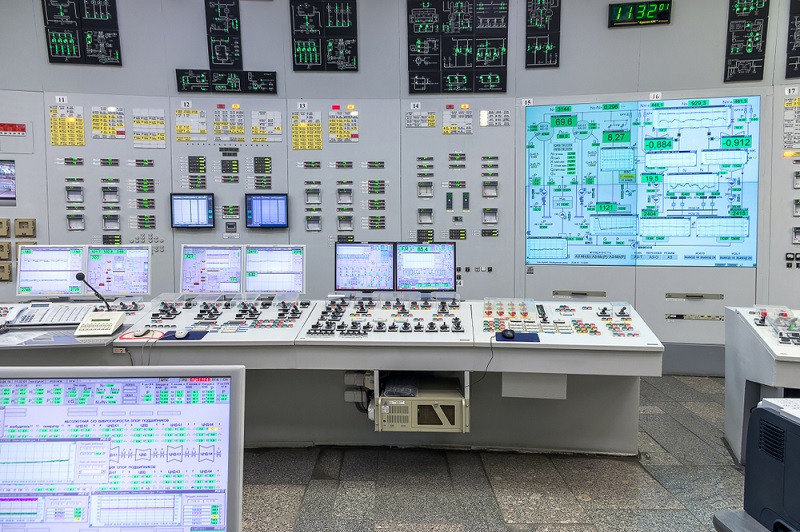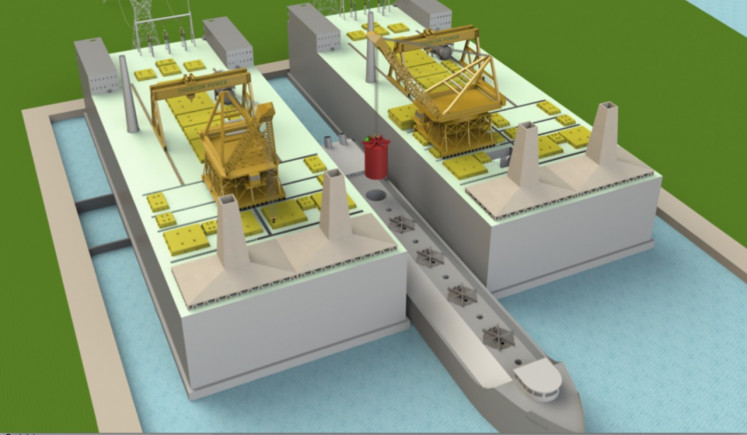This company wants to build Indonesia’s first commercial nuclear power plant
Change Size
 Central control room of a nuclear power plant (Shutterstock/ muph)
Central control room of a nuclear power plant (Shutterstock/ muph)
T
horCon International Pte Ltd has been pushing to build an experimental nuclear power plant in Indonesia over the past five years, but with unproven technology and regulatory limitations, the company is unlikely to finish the facility by the expected deadline.
The Washington-based power producer has been engaging with Indonesian regulators and state-owned enterprises to launch a 500-megawatt floating nuclear power plant in the country by 2027.
Regions considered for the US$1.21 billion facility are Bangka Island, Sumatra and West Kalimantan. While enterprises are waiting, regulators do not appear driven to finish the project within seven years.
“What we need is just a piece of paper from a ministry that says ‘Yes, let’s do this’ and then work together to propose a presidential regulation,” said ThorCon’s Indonesia representative Bob Effendi in Jakarta on Feb. 3.
“There are certain things we have to start doing this year, and the cost is quite big: billions of rupiah. We will not finance something worth billions without some sort of certainty,” he added.

Indonesia’s energy policies have indeed been steering away from nuclear plants since then-president Susilo Bambang Yudhoyono issued a government regulation in 2014 that declared such plants “a last resort option” to power the country. The regulation instead prioritizes coal, natural gas and renewables, namely geothermal, solar, wind, hydropower, bio and tidal energy, for electricity production.
Due to the regulation, neither the Energy and Mineral Resources Ministry nor the National Nuclear Energy Agency (Batan) appear keen to finish ThorCon’s plant by 2027.
Energy Minister Arifin Tasrif told legislators in Jakarta on Jan. 27 that “our priority for national electricity supply is to make renewables contribute 23 percent of the energy mix by 2025”, as per Indonesia’s commitment in the Paris Climate Agreement.
The controversial omnibus bill on job creation amends, revokes and adds several articles in Law No. 10/1997 on nuclear energy that will streamline business licensing for potential nuclear energy development. The central government will form a supervisory body to monitor any nuclear energy activities.
Read also: Time for nuclear power? Luhut tells tale of Indonesia ‘having it all’
Meanwhile, Batan nuclear facilities director Dandang Purwadi told The Jakarta Post on Feb. 14 that ThorCon’s commercial plant would more likely be operational by 2040, as “we have to wait around 10 years for the technology to mature, then take 10 years to build the facility”, according to the draft bill.
He was referring to thorium-fueled molten-salt reactor technology that is at the heart of ThorCon’s proposed nuclear plant. Such technology, he continued, had only been tested “on an experimental scale inside a lab” and needed to undergo a demonstration phase before entering commercial operation.
“The time that would be required to build a commercial thorium plant very much depends on the readiness of the technology,” he reiterated.
Despite the regulatory hurdles, ThorCon continually engages state-owned shipbuilder PT PAL, tin miner PT Timah and electricity company PLN to, respectively, develop, supply fuel and offtake power for the 500 MW plant while awaiting regulatory certainty.
ThorCon signed an agreement with PAL in July last year to conduct a feasibility study on building the reactor. If the test goes well, the two companies plan to conduct several rigorous tests this year, begin construction in 2023 and finish the plant by 2026. PAL would be working with South Korea’s Daewoo Shipyard & Marine Engineering (DSME) to build the reactor.
With regard to supply, ThorCon is in talks with Timah. Thorium, which can be found in monazite ores, is a byproduct of tin mining, and the state-owned mining company is currently the world’s largest producer of refined tin after China’s Yunnan Tin Co.
According to a 2015 Batan survey, Indonesia has 133,000 tons of thorium reserves, 95 percent of which could be found in Bangka Belitung province, where Timah operates two mines. The country’s reserves represent 2 percent of global reserves. India has the largest share of reserves at 846,000 tons.
“I’ve been in contact with them, but I think their technology is still very much up there. In principle, we are ready with the raw material,” Timah president director Mochtar Riza Pahlevi Tabrani said on Feb. 10, adding that the miner had signed an agreement with Batan to store monazite ores.
With regard to offtaking, ThorCon signed an agreement in November last year with PLN, Indonesia’s largest utility company, to conduct a feasibility study on the nuclear plant.
“We won’t make any decision nor promise today. We are monitoring developments,” said PLN deputy president director Darmawan Prasodjo on Jan. 23.
Indonesia is not entirely inexperienced with nuclear technology. Southeast Asia’s largest economy owns three nuclear reactors for research purposes. These are the 2-MW Triga 2000 reactor in Bandung, West Java, the 30-MW GA Siwabessy reactor in Serpong, Banten, and the 100-kW Kartini reactor in Yogyakarta, which also hosts the Nuclear Technology College (STTN).









